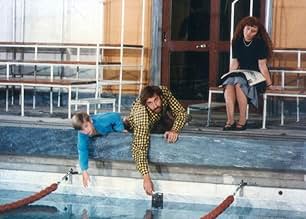Palombella rossa
- 1989
- Tous publics
- 1h 29m
Because of an accident, Michele (a leader of P.C.I. and a water-polo player) loses his memory. During one water-polo match, strange guys torment him; they want him to remember his past. As t... Read allBecause of an accident, Michele (a leader of P.C.I. and a water-polo player) loses his memory. During one water-polo match, strange guys torment him; they want him to remember his past. As the match is about to finish, he misses the penalty which would have let his team draw the ... Read allBecause of an accident, Michele (a leader of P.C.I. and a water-polo player) loses his memory. During one water-polo match, strange guys torment him; they want him to remember his past. As the match is about to finish, he misses the penalty which would have let his team draw the match and keep the leadership.
- Awards
- 6 wins & 15 nominations total
Featured reviews
It's a film of my adolescence and nowadays it looks, feels and sounds quaint and almost naive -- but also courageous. Which Italian director would risk today to make a two-hours dream-like, heavily metaphorical political movie? And whose director would manage to make something so hilarious out of it?
I wish I could share at length how much Red Lob influenced me and my whole generation. Some scenes, like the one where Michele slaps the journalist in the face because she is using clichéd expressions, or the one where he tries to explain to a Catholic politician why they are different, are still quoted today and are part of our cultural baggage.
If you've never seen a Moretti movie, maybe start by something more conventional like The Mass is Ended but please don't pass by Red Lob, because it's a real treat.
Throughout the film the protagonist, Michele, reiterates a phrase that captures a good deal of the identity of the PCI: `We're the same, but we're different.' The PCI claimed, on the one hand, that it was like any other party: it sought to arrive at power by winning a consensus at the polls and electing its candidates to public office--a party with just as much right as any other (`of equal constitutional dignity') to exercise power within a democratic state. On the other hand, the party said that it was different from all the others because it wanted to use state power in order to bring about a transformation of the existing social and economic order: to build a society in which the exploitativeness, irrationality, all-pervasive commercialism, environmental degradation, and social injustice characteristic of capitalism would be gradually overcome. The party was in the system, but not of the system. This, then, was a party that appealed to the dreams of many idealistic Italians to create a better world to live in (party membership fluctuated between 1.5 and 2 million--and the party saw its percentage of the vote rise in every election for 30 years, cresting in '76 at about 35%).
But as the party got closer to being brought into the government, the tightrope act became more and more tortuous--hence, all of those very contorted "party lines" articulated by Michele in which he attempts to explain why the party should be brought into the government (and why there was nothing to fear from the party), while still holding on to the notion that the party stood for opposition to the existing social order. And that's why another constant refrain in the film is Michele's `I remember': he remembers not only things from his own past, but also a time when the party really seemed to stand for the traditional ideals of the Left.
Now the PCI looks pretty much like any other party, and it no longer even calls itself a party, thus distancing itself from its Marxist-Leninist past: its name today is the unthreatening `Democrats of the Left.' And millions of progressive Italians feel adrift now that they have no party as the repository of their idealism--a sense of desperation expressed beautifully by Michele when he cries out, `Di qualcosa di sinistra' (`Just say something leftist').
By the way, the English title given to the film (`The Red Wood Pigeon') makes absolutely no sense. `Palombella' refers to that shot in water polo we would call a `soft lob' and `rossa' =`red'. So a `palombella rossa' is a `red lob,' symbolizing the kind of soft landing that the PCI sought for its revolutionary program.
There are many references to the Italian culture, ranging from politics to music, cinema and sport. Some scenes ascended to a cult status, such as the famous slap. Overall an entertaining movie, thanks to the eccentric characters that populate the pool where the (inner) action takes place.
Did you know
- TriviaThe meaning of "palombella" in Italian includes "columbine", "wild pigeon", and (in water polo, or in other ball sports) "a parabolic shot to go over the goalkeeper and score a goal"/"a lob shot". So the original title of the film could be read as "Red Lob", which brings the sport and the politics -red obviously signifies the Communist Party- together.
- ConnectionsEdited from La sconfitta (1973)
- SoundtracksE ti vengo a cercare
(1988)
Written by Franco Battiato
Performed by various characters
Courtesy of EMI Music Italy Spa
- How long is Red Wood Pigeon?Powered by Alexa
Details
- Release date
- Countries of origin
- Official sites
- Language
- Also known as
- Red Wood Pigeon
- Filming locations
- Production companies
- See more company credits at IMDbPro












